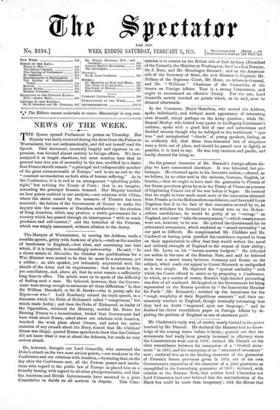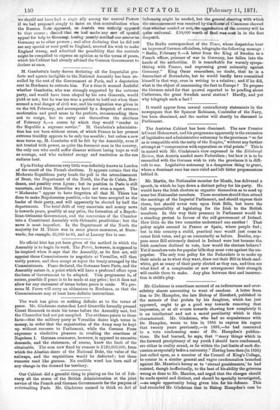Mr. Gladstone's reply was, of course, nearly limited to the
points touched by Mr. Disraeli. He declared the Ministry had no know- ledge of the coming storm before it broke; pointed out that the armaments had really been greatly increased in efficiency since the Conservatives went out in 1868 ; twitted Mr. Disraeli on the close resemblance between his conception of a "bloated arma- ment" in 1861, and his conception of an " attenuated armament" now; confuted him as to the binding character of the guarantee of Prussia's Saxon provinces given in 1815, out of his own Government's exposition of the character of a joint guarantee as exemplified in the Luxemburg guarantee of 1868 ; declared, with relation to the Russian Note, that neither Lord Clarendon nor Lord Palmerston had ever believed that the neutralization of the Black Sea could be more than temporary ; told the House that we should not have had a single ally among the neutral Powers if we had proposed simply to insist on this, neutralization when the Russian Note appeared, as Austaia was entirelE opposed' to that course ; disniot that see had made any Mir t oft special: appeal for help to Serrasar, basing ,nrezelysnotifiettoun enure& to Germany as to other powers ; and after declaring that he did not see any special or near peril to England, avowed his wish to make England strong, and admitted the possibility that the neutrals might be compelled to express an opinion as to the terms of peace, which his Cabinet had already advised-the-German Government to declare at once.































